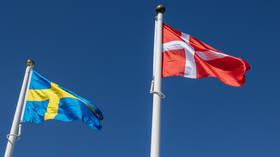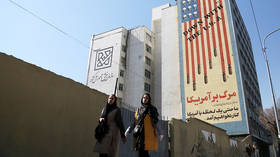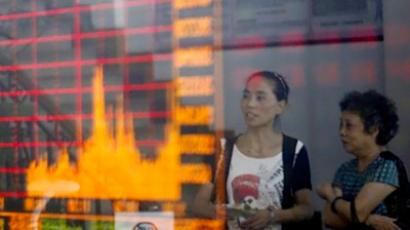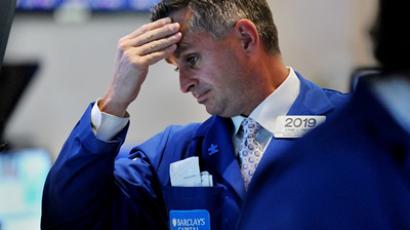Asian markets join global freefall
Asian markets have followed the global selling binge amid fresh recession warnings and mounting debt in the Eurozone. We are seeing a sea of red across the board, with the stall in China's flying growth contributing to trader concerns.
The Asian markets were already falling in response to the news of the S&P downgrade of the US credit rating, but it had been considered a temporary event. The latest slump has therefore come as a shock to investors in the region, who were not expecting such a reaction, given Asia's strong economic outlook.But the bad news from the US and Europe turned out to be too much for the Asian markets as Morgan Stanley Bank announced that both the US and Europe are dangerously close to a recession.The Asian countries are obliged to closely follow the situation in the West as they hold $3 trillion of US debt.In China, the Shanghai Composite was down 1.6% in early trading, while the Hang Seng in Hong Kong fell 2.7% and Japan's Nikkei sank 2.1%.Selling fever struck Asia after American and European stocks plunged on Thursday.World markets have been rocked since the US was stripped of its AAA credit rating earlier this month. Across the Atlantic, French and German leaders tried to shore up their ailing economy with a set of proposals which included the creation of a European government. But so far, the markets have failed to react favorably. Patrick Minford, a professor of applied economics at Cardiff Business School, says the markets are still concerned about growth.“There’s been inflation in the world economy, and there’s been quite a tightening of monetary policy around the world, especially in China and India and some of the other emerging markets,” he told RT. “And this led to a fall back in growth in those countries and elsewhere. The markets are worrying about the slow growth.”“What is happening,” he continued, "is that the Western economies, the richer economies, are having a harder time of it. All the growth and availability of raw materials is being taking by countries like China, India and Brazil, thus leaving very little scope for the richer countries to grow. And they are groaning under these very high oil prices, which depress their incomes and make them much more cautious.”“We just have to grin and bear it, just keep up going through this crisis,” he stated. “The euro-zone will take time to sort itself out. Either the euro will break up, or they will produce a fiscal union with big transfers to bail out all these countries – nobody really knows which. But that won’t be resolved anytime soon.”
To counter a second recession in the US and Europe, Asian countries should promote further regional co-operation by drawing around China, believes Mr. Xiang Songzuo, a Deputy Director of the Center for International Monetary Research in Beijing.“Chinese authorities are taking many measures to stimulate private and direct foreign investment into China and also they try many new policies to reform the income distribution mechanism, thus enhancing the income of the low-level people and stimulating employment,” revealed Mr. Xiang. “Through these measures the Chinese authorities want to make country’s economy much more independent and in the nearest future we will see more steps taken by Beijing to stimulate its own economy and to try to strengthen co-operation with other Asian countries.”














